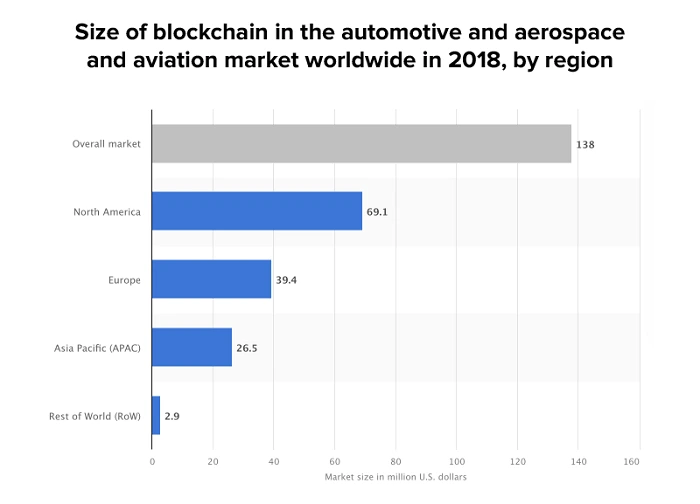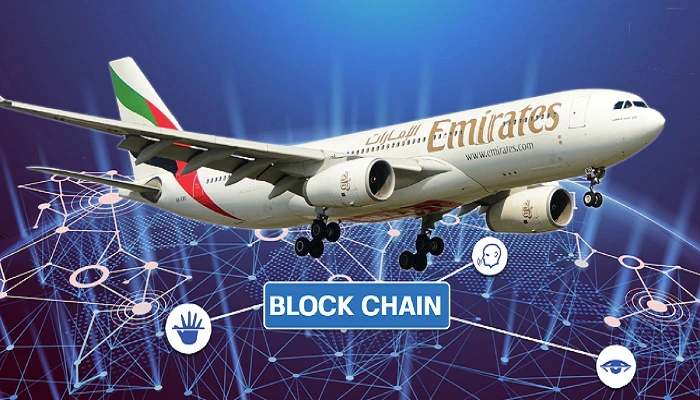Decentralization, nodes, and distributed messaging protocol are just a few of the technical terms that experts use when talking about blockchain technology. The list goes on, and most of them are difficult for the average person to comprehend.
According to experts, the aviation industry is a natural fit for blockchain networks because it offers an incorruptible, digital, effective way of monitoring supplies and parts, among other things. Is blockchain just buzzword jargon, or could it actually help the aviation sector?
Let’s find out how blockchain technology is revolutionizing the aviation software development industry.
Blockchain’s Place in the Aviation Sector
Blockchain technology is revolutionizing the aviation industry through a number of avenues. Its main quality is that it is impenetrable and secure. The accuracy and integrity of the data are thus preserved, which is helpful for the aircraft business.
As a result, the recent advancements in blockchain technology have the potential to be extremely advantageous for the aviation industry. It places a high value on data integrity. As per Statista, the blockchain market in the aviation industry has been valued at $69.1 million recently.

7 Ways How Blockchain is Revolutionizing the Aviation Software Development Industry
Blockchain in the flight industry can therefore be very advantageous to both airlines and passengers. Overall, blockchain technology is gaining popularity in the aviation sector. Due to its ability to offer tangible advantages and a seamless travel experience.
1. Identification Management
In the aviation sector, assuming someone else’s identity carries significant dangers, including the potential for terrorist activity at airports. On the blockchain, biometrics may be used to verify IDs.
Additionally, after being confirmed, the identity is recorded on the blockchain. This is unchangeable due to the decentralized and secure structure of the network. Blockchain may ultimately result in biometric identification replacing paper passports, in addition to reducing human error during the identity document verification process.
2. Automated Travel Systems Advancements
All airlines suffer inefficiencies due to fragmentation costs. They arise as a result of price differences caused by supplemental features like upgrades and premium services. Additionally, from customers moving to alternative providers or operators in an effort to save money.
By offering airlines, travel companies, and other industry players a uniform system for booking an entire trip, blockchain technology offers the potential to make these cost reductions more straightforward.
It would include items like loyalty schemes that affect travel costs as well as non-airline-related services like lodging and ground transportation.
3. Improves Client Satisfaction
The consumer experience could be improved by the use of blockchain technology in the airline business. With real-time flight information, tokenized tickets, digital record keeping, transparency, data integrity, and biometric verification available to passengers, there is no question that blockchain technology for airports will improve consumer happiness. It will lessen the possibility of mistakes and make the processes even simpler.
4. Manufacturing Potential
In terms of production capacity, blockchain technology has the ability to increase the transparency and efficiency of the aviation welding supply chain. In order to provide real-time insight into the supply chain and reduce the likelihood of delays or disruptions, it could be used, for example, to track the transfer of supplies and equipment from manufacturers to suppliers.
5. Increases the Lifecycles of Aircraft
Airlines can monitor an aircraft’s lifecycle from manufacturing to maintenance and repair with the aid of blockchain, which enables better tracking and management of aircraft parts and components.
6. Flight Record System Protection
Blockchain can help gather and store all the information associated with a particular aircraft, including manifests, flight paths, cargo onboarding, and other details. The information can be used for a number of things, like locating lost luggage or learning the names and seat numbers of those traveling on the aircraft.
7. Multiple Frequent Flyer Schemes
Airline loyalty programs are very different from frequent flyer programs and have a lot of room for growth in terms of customer incentivization, even though both are intended to capitalize on customer loyalty.
Blockchain technology can make it simpler to integrate the loyalty programs of various airlines within a partnership, providing customers with a wide range of redemption options for their accrued miles. Blockchain can also be used to control aspects like revenue sharing, reward point redemption, and point accrual.
8. Private Aircraft Transaction History
Knowing an aircraft’s title and possession rights is crucial for transactions involving the aircraft, particularly when commercial aircraft have been owned by a number of different parties since they were first built. Up to 30% of aircraft titles, according to projections, may be opaque in some way. For instance, the engines of a specific airplane may have been leased, while the airframe may be subject to a bank lien.
Before the ownership rights of the aircraft can be fully determined, a comprehensive examination of its history during the purchase process necessitates the involvement of specialized agencies and several weeks of due diligence. In accordance with the FAA or the International Registry of Mobile Assets, an airframe and engine title tracking system built on a blockchain ledger can be used to record, update, and monitor possession rights.
9. Maintenance, Repair, and Overhaul (MRO)
Every time a part is handled or moved or a maintenance action takes place, blockchain records and digitally logs the data. The accurate and immediately available records that are produced by this electronic trail of activity make it easier to identify nonconformity during the due diligence process, leading to safer airplanes, more secure data processing and storing, and better maintenance operations.
Closing Thoughts
In the aviation sector, blockchain technology offers a streamlined system for the quick distribution of income, reducing overall costs and removing potential delays brought on by revenue-sharing disputes. By creating a single system that adheres to predetermined criteria, blockchain helps flights remain on schedule and avoid delays.
Airlines can carefully reconsider their business processes to optimize benefits by implementing blockchain with additional technologies like IoT and AI. The perfect moment for airlines to work with a reputed aviation software development company and benefit from this ground-breaking innovation.






